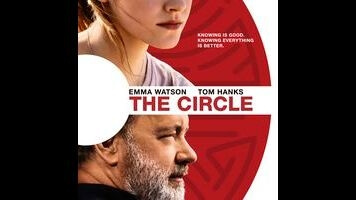Mae, who has been working customer service for a utility company, is delighted with the opportunity to, well, still work customer service, but someplace with nicer computers, measurable outcome metrics, and a chummy, familial vibe. She’s a few weeks on the job before she’s pushed to spend more time at the office—non-mandatory-but-kind-of-mandatory fun, of course—and realizes that everyone seems to know about how her parents (Glenne Headly and the late Bill Paxton) are dealing with her dad’s MS. Every facet of her life, it seems, is subject to unsolicited crowdsourcing.
Even when she’s taken aback by these invasions of privacy, Mae goes with the flow, while her plain-folks childhood friend Mercer (Ellar Coltrane) grumbles about wanting to make connections in person, where he can look people in the eye. Coltrane essentially plays the part as if his Boyhood character progressed no further than where that movie left him, and whether it’s his relative inexperience as an actor or the thin writing of this part (most likely both), Mercer comes across as a hilariously insufferable excuse for a moral center. He and Mae are purported to have gone on “adventures” in the past, but apart from woodworking in isolation and looking people in the eye, Mercer’s main interest seems to be maintaining a surly superiority over anyone who checks email more than twice a day. His counterpoint-issuing function in the narrative is decidedly low-tech.
Mercer feels especially unnecessary because Ponsoldt shows that he can convey a lot of information with profile-page speed. Within about five well-edited minutes at the front, the movie touches upon Mae’s dead-end job, favorite hobby, family relationships, and ringtone without belaboring any of it. As she moves into The Circle (and the takes get longer and snakier), many smaller details continue to ring true, or at least funny. Mae’s initial interview, for example, goes into a “lightning round” that’s a cross between a BuzzFeed quiz and Scientology processing. Later, when the movie tilts more toward science fiction (or, more accurately, features technology that seems vaguely believable but is almost completely unexplained), it unveils its most lovingly realistic feature. Mae winds up with an extremely popular social media feed of sorts, and the endless Facebook-style comments make up a perfectly mixed on-screen stream of sudden adulation, snark, and asinine tangents.
A passing resemblance to The Truman Show is the best thing the second half of The Circle has going for it. It’s around the halfway mark that the movie starts doling out muddled or awkward scenes, including its ill-advised decision to have the plot turn on a clumsily staged kayaking mishap. Watson doesn’t have much to work with because Mae seems so maddeningly easy to sway, and while Hanks uses his persona well as a businessman who endeavors to appear avuncular at all cost, he doesn’t have enough screen time to take his character any further. Poor John Boyega has it even worse; as a mysterious star programmer who skulks around the Circle campus, he spends a lot of time standing around in consternation.
There are some interesting points somewhere in The Circle about how giant tech companies gussy up their overreaches as democratic victories for humanity and transparency. But this is a strange (and, given when the movie was written and shot, mostly unlucky) time to conflate transparency with the death of privacy. In another, more controlled movie, the lack of a clearly stated evil plan, or the lack of a corresponding good-guy plan to take it all down in a burst of Luddite revolution, would strike welcome notes of ambiguity. In The Circle, it’s more of a passable but ultimately unstructured airing of vague grievances.

